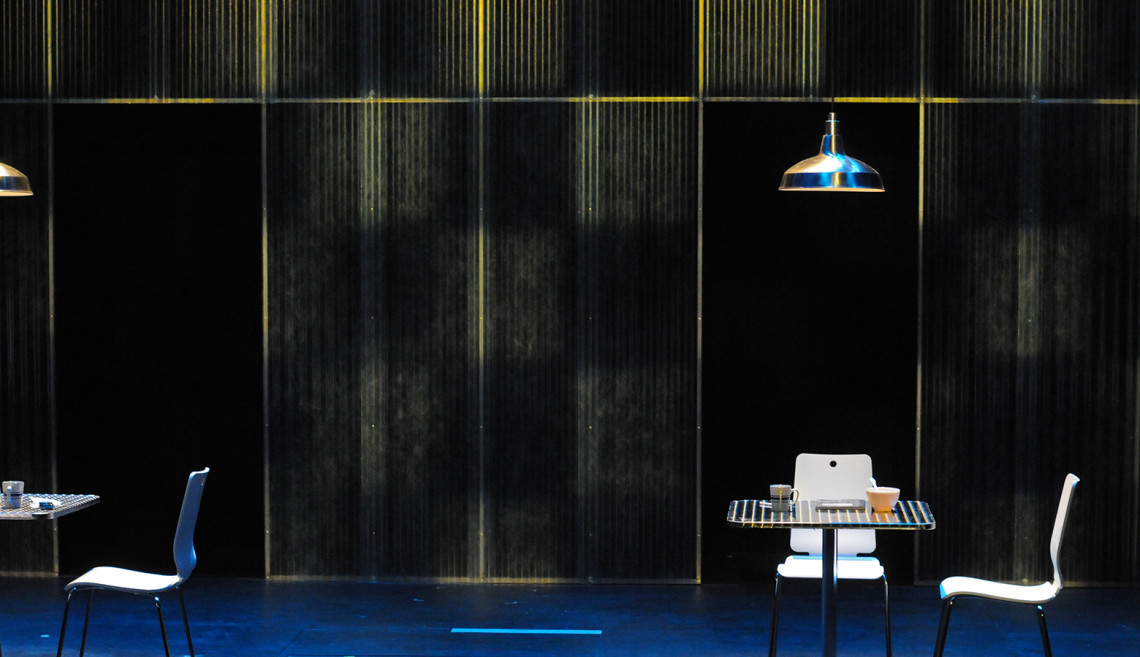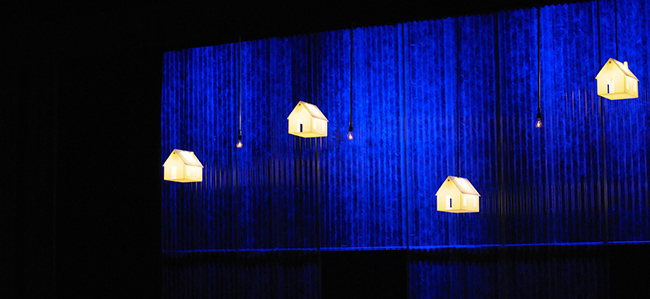
Set for Dead Man's Cell Phone.
Stefanie OkudaDead Man’s Cell Phone at Pigott Theater
Beginning on Thursday, May 16, four performances only.
Leanna Keyes: Dead Man’s Cell Phone (DMCP) ponders issues of technology and connectivity. At this particular historical juncture, it seems people are never more than a text message away, and the idea of not having a cell phone at all is inconceivable. How does Stanford’s position within Silicon Valley and start-up culture affect your approach to the play?
Isaiah M. Wooden (Director, Dead Man’s Cell Phone): I was drawn to direct Dead Man’s Cell Phone, in part, because of the ludic ways that it interrogates the technological fetishism that pervades so much of our techno-consumerist culture. Silicon Valley, of course, has played a central role in the production, maintenance and proliferation of that culture—indeed, the moniker “Silicon Valley” often circulates as a metonym for technological innovation—and Stanford has been crucial to the “disciplining” of it. Whenever I approach a play, I try to accent those things that will perhaps provoke new insights for spectators. Accordingly, a question that has informed my approach to staging Ruhl’s text for Stanford audiences is: What does it mean to direct a play that dramatizes the paradoxical ways that technology has come to structure how we relate and engage—indeed, a play that illuminates the ways that technology can at once produce feelings of deep connection and profound isolation—in and against a backdrop that fetishizes technological advancement and the “new”?

Stefanie Okuda
LK: How have your relationships with the actors affected the production? Have their own perspectives revealed new insights into the characters?
IW: The text invites risk-taking performances. I feel particularly fortunate to have worked with a company of actors that always arrived at rehearsals game to play. Indeed, part of our work together over the last several weeks has been to discover what motivates each character and to determine their responses to the given circumstances of each scene. It was an exceedingly collaborative process that yielded myriad insights about the characters, the play, and the performers’ relationships to both the characters and the play. Audiences, I think, will be struck by the incredible humanity that inflects each of these performances. This, to be sure, is a reflection of the sense of communion that we generated as a company early in our process.
LK: DMCP exists in something of a void–the sets are minimal, the story travels between worlds, and the script often gives minimal instructions for staging. What challenges or opportunities did this present to you as a director?
IW: The play’s quick shuttles between the epic and the mundane, the philosophical and the existential, the here and now and the there and then presented a wealth of opportunities to activate the imagination. The amazing team of artists with whom I collaborated gifted our process immense creativity. Indeed, together, we attempted to conceptualize a production that was remarkably attuned to the text’s wildly divergent dimensions. The production has several spellbinding coups de théâtre that, I hope, will delight audiences. Of course, our deployment of theater technology to address many of the challenges that the script posed is worth noting in light of the play’s themes.
LK: Sarah Ruhl is one of the most famous playwrights in the contemporary American theater, yet Dead Man’s Cell Phone has received less critical attention than some of her other work, such as The Clean House, Eurydice or more recently In The Next Room (or The Vibrator Play). How does working with a text from one of the “big names” affect your process?
IW: One of the earliest questions that I asked the cast was about their relationship to Sarah Ruhl’s plays. I was surprised to learn that several of them had no previous exposure to her work. My relationship to Ruhl’s work dates back to 2005 when I saw a great production of The Clean House at Woolly Mammoth Theater Company (Woolly) in Washington, D.C. A colleague from Georgetown, the incomparable Sarah Marshall, offered a sidesplitting performance as Virginia in it; I remember laughing until I cried. I saw several other productions of Ruhl’s plays throughout D.C. thereafter: Arena Stage’s world premiere of Passion Play, a Cycle in 2005; Georgetown University’s D.C. premiere production of Eurydice, which followed a production of The Gospel of Colonus I directed there, in 2006; and, the world premiere of Dead Man’s Cell Phone, again, at Woolly in 2007. In addition to Ruhl’s evocative dramaturgy, what stood out across each of those productions was the excellence of the direction. Ruhl’s language, I think, engenders in directors a desire to think big and boldly. Spending time playing in the highly theatrical world that she fashions in Dead Man’s Cell Phone has been everything I imagined it would be and so much more. The play, I should note, is quite different from the other works that I have directed at Stanford: Eisa Davis’s Bulrusher, Nilaja Sun’s No Child…, and Beyond My Circle, the devised performance piece that I co-directed and co-devised with collaborators from Stanford and Makerere Universities. It’s been fun to flex a different set of creative muscles.
LK: You’re also an advanced PhD student in the TAPS program. How does this show intersect with your scholarship?
IW: I claim both performance-maker and theater scholar as identities. Indeed, my scholarship synergizes creative practice and critical inquiry. Typically, I launch a directing project with a clear sense of its relationship to my scholarly work. I didn’t in this instance. Directing the play, however, has sparked a flurry of ideas about future writing projects, particularly around questions of technology and affect. Indeed, I am still interested in thinking deeply and critically about the question that framed my conceptual approach to the play. I am excited to see what comes of further engagements with it.
